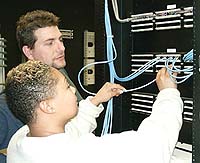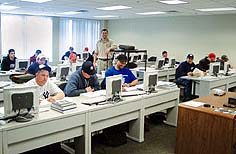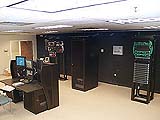
|
 |
| Third-year Local 164 Training Academy apprentice Iman Yusef (foreground) terminates high-speed data cable as third-year apprentice Tony LaSpisa observes. |
Approved by President Hill and NECA’s chapter governors, the agreement is the result of several years of study and debate among workers and contractors in the field of information technology installation, said IBEW Construction Department Director Mark Ayers. A similar agreement has also been negotiated for residential installations.
"Five years ago, we identified IT [information technology] as a rapidly moving target," he said. "We knew that we had to ramp up our apprenticeship training and collective bargaining. We were very much aware that careers in the VDV area are going to be very good careers in the IBEW."
VDV, the integral hardware component that powers our culture of information technology, applies to broadband, computer networks, multimedia devices and telecommunications services. In the industry, the work falls under the broad heading of "integrated building systems," computerized control of the function of every electrical system under the roof. The VDV agreement includes the installation, testing, service and maintenance of all VDV systems transmitting voice, sound, vision or digital data for commercial, education, security and entertainment purposes.
The agreement will have the most direct impact on the unionized construction industry. Its "outside the box" approach to training and compensation is unprecedented, as is its recognition of a workplace culture fundamentally different from most construction sites, Ayers said.
 |
| Local 164 Training Academy |
In the past, much of the VDV work has been claimed by inside locals. The agreement is an acknowledgment the job requires a separate work force with an entirely new set of skills. VDV installers are "technicians," not wiremen, and are trained in three years versus the traditional five years for a journeyman electrician.
"VDV technicians are a separate group and are inclined to want a different set of rules," Ayers said.
Ayers also noted that the less physically demanding nature of installing low-voltage systems makes the jobs more attractive to a broader segment of the population and could be a boost to future recruitment. "There’s no running big pipe and dragging 500 MCM cable through cable trays," he said. "Working with fiber optic cable and category five wiring is light duty in terms of physical demands."
Paid vacations and holidays are established uniformly in the national agreement, which is "unheard of in the construction industry," Ayers said. Another unique characteristic of the national agreement is the 100 percent portability of workers from one jurisdiction to another, Ayers said.
Most of the some 35,000 IBEW members covered by the agreement are new to the field. Many are fresh out of their three-year apprenticeship training in the installer technician telecommunication program offered by locals in training centers across the country.
Recognizing more than 20 years ago the importance of preparing members for the future in electronics, Local 164 in Jersey City, New Jersey, started a program that became progressively more comprehensive through the tech boom of the late 1990s and early 2000s. Jersey City Local 164 Training Academy has one of the most advanced integrated building systems in the IBEW.
"The program got bigger and bigger as the technology went through the roof," said Local 164 Business Manager Richard Dressel. He said contractors in the local’s jurisdiction sign up because they know IBEW members are well trained and certified for the VDV jobs. Partnerships with local high schools and vocational centers ensure a steady stream of apprentices.
The potential for the amount of work for members is unlimited, Ayers said. "If we do our job right and we’re successful, chances are good that a contractor leaves behind one or more technicians to maintain the system."
The NJATC is now providing training for systems integrators, Ayers said. Already highly sought after, system integrators configure systems and apply corresponding software.
"The inside and outside branches of the IBEW were built upon a foundation of providing a readily available pool of highly trained, skilled and productive workers," Ayers said. "Our VDV market is being built upon the same premise. We have to apply the age-old principles and resolve to be the best and sole source of reliable, dependable professionals."
![]()
Highlights of National Agreement
The VDV national agreement, designed to promote a better working relationship among the IBEW, signatory contractors and their customers, is a model for those who have not negotiated their own VDV agreement and a formidable tool for contractors to competitively bid projects for clients with nationwide interests.
Highlights of the three-year pact include:
